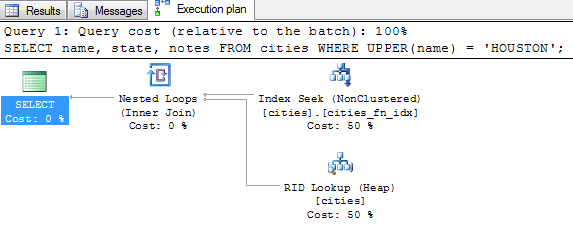| 일 | 월 | 화 | 수 | 목 | 금 | 토 |
|---|---|---|---|---|---|---|
| 1 | 2 | 3 | 4 | 5 | 6 | |
| 7 | 8 | 9 | 10 | 11 | 12 | 13 |
| 14 | 15 | 16 | 17 | 18 | 19 | 20 |
| 21 | 22 | 23 | 24 | 25 | 26 | 27 |
| 28 | 29 | 30 | 31 |
- 입사지원서
- 스크립트
- 미래대비
- oracle
- Ha
- 애플
- 자소서
- PLSQL Developer
- 파이썬
- SQL
- Python
- AWS
- 영상편집
- 개발가이드
- 동영상
- 자격증
- MySQL
- MSSQL
- 빅데이터
- 자료
- 오라클
- nvarchar
- 유투버
- 오라클 프로시저 반복 실행
- Chainer
- 혁신성장
- 여행
- 튜닝
- 머신러닝
- ISMS
- Today
- Total
뽁
[SQL2014] Function based index (본문 하단에 실전예저 포함) 본문
출처 http://www.sqlines.com/oracle/function_based_indexes
SQL Server:
-- Define a table CREATE TABLE cities ( name VARCHAR(90), state CHAR(2), notes VARCHAR(90) ); -- Insert some data INSERT INTO cities VALUES ('Houston', 'TX', '4th largest city in the US, and the largest city in Texas'); INSERT INTO cities VALUES ('Seattle', 'WA', 'the largest city in the Pacific Northwest'); -- Create index (non-function based) on name column CREATE INDEX cities_name_idx ON cities (name);
UPPER function is not required to return the correct results, so index on name column can be used:
SELECT name, state, notes FROM cities WHERE name = 'HOUSTON';
Output:
| name | state | notes |
| Houston | TX | 4th largest city in the US, and the largest city in Texas |
Implementing a Function-Based Index
But let's use UPPER function as an example how to implement a function-based index using a computed column and index on it in SQL Server:
SQL Server:
-- Define a table with a computed column CREATE TABLE cities ( name VARCHAR(90), state CHAR(2), notes VARCHAR(90), upper_name AS UPPER(name) ); -- Insert some data INSERT INTO cities VALUES ('Houston', 'TX', '4th largest city in the US, and the largest city in Texas'); INSERT INTO cities VALUES ('Seattle', 'WA', 'the largest city in the Pacific Northwest'); -- Create an index on computed column that acts as the function-based index CREATE UNIQUE INDEX cities_fn_idx ON cities (upper_name);
Note that SQL Server allows you to not specify columns list (name, state, notes) although INSERT omits the value for the computed column.
Now SQL Server uses the index on the computed column even if you still use UPPER(name) function in the query, not only upper_name column:
SQL Server:
SELECT name, state, notes FROM cities WHERE UPPER(name) = 'HOUSTON';
Execution plan:
There are just 2 rows in the table, so we used UNIQUE index to force SQL Server to use it, and demonstrate that a index on a computed column can be used even if the query still uses a function in WHERE.
-----------------------------------------------------------------
실전예제
# 테이블 생성
CREATE TABLE [dbo].[Z_TB_COM101_0319](
[PLAY_DATE] [varchar](8) NOT NULL,
[THEA_CD] [varchar](4) NOT NULL,
[SCREEN_CD] [varchar](3) NOT NULL,
[SEQ] [int] NOT NULL,
[PLAY_STRT_TIMS] [varchar](4) NULL,
[PLAY_DATE_STRT_TIMS] AS PLAY_DATE+PLAY_STRT_TIMS --> FBI 을 위한 computed 컬럼
)
#인덱스 생성
SET ANSI_PADDING ON
GO
/****** Object: Index [IX_TB_COM101_02] Script Date: 2015-03-19 오후 3:11:48 ******/
CREATE INDEX [IX_Z_TB_COM101_0319_03] ON [dbo].Z_TB_COM101_0319
(
[PLAY_DATE_STRT_TIMS] ASC
)
GO
# 쿼리문 비교
※ 해당 쿼리문은 전체 28000 건 중 28000건을 조회한다. (FULL SCAN)
1. FBI 생성 전
SELECT DISTINCT
MVE_CD
,THEA_CD
FROM TB_COM101 WITH(NOLOCK)
WHERE PLAY_DATE + PLAY_STRT_TIMS >= CONVERT(VARCHAR(8), DATEADD(DAY, -1, GETDATE()), 112) + '240100'--PLAY_DATE >= CONVERT(VARCHAR(8), DATEADD(DAY, 0, GETDATE()), 112)
2. FBI 생성 후
SELECT DISTINCT
MVE_CD
,THEA_CD
FROM TB_COM101 WITH(NOLOCK)
WHERE PLAY_DATE + PLAY_STRT_TIMS >= CONVERT(VARCHAR(8), DATEADD(DAY, -1, GETDATE()), 112) + '240100'--PLAY_DATE >= CONVERT(VARCHAR(8), DATEADD(DAY, 0, GETDATE()), 112)
# 결론
FULL SCAN 쿼리문에서는 computed column 을 만들어내기 위한 계산 과정이 추가되기 때문에 성능이 오히려 저하된다. 즉, 상황에 맞게 FBI 를 사용해야 하며 반드시 쿼리 TRACE를 통해 확인해야 한다.
'IT Cafe+ > MS-SQL' 카테고리의 다른 글
| DB2 TO MSSQL 데이터 이관 방법, MSSQL BCP 이용 (0) | 2020.08.09 |
|---|---|
| [MSSQL] 세계 시간(타임존, Time zone) 계산 함수(function) (0) | 2019.02.21 |
| [MSSQL] 다국어 사용을 위한 방법. National JDBC (0) | 2018.12.26 |
| [MSSQL] 다국어 - INSERT 시 N'컬럼값' 사용 (0) | 2018.12.12 |
| [MSSQL] PIVOT을 이용한 행을 열로 만들기 (0) | 2016.08.17 |



